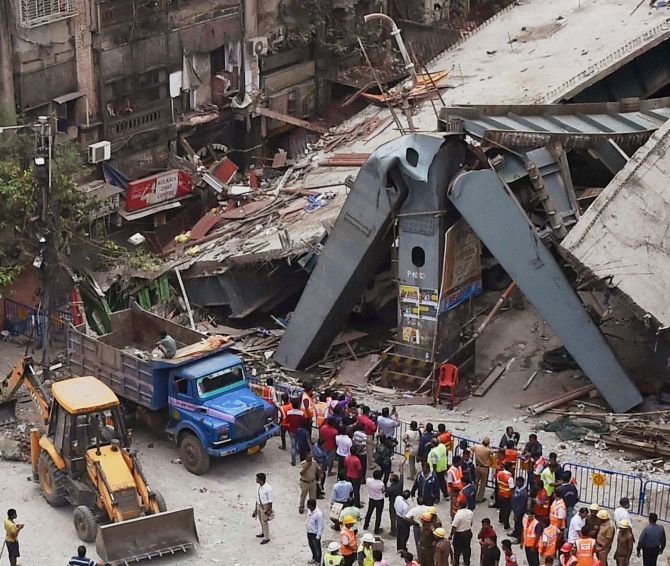‘Experience tells me that there must have been some serious flaw in construction.’
‘In India, there is too much flexibility and rules are altered at the drop of a hat.’

“I am in deep shock. It hurts to see so many lives snuffed out like this,” says Kolkata-based veteran civil engineer Subhash Bhattacharya.
“Besides, it’s also painful to watch such a huge construction, which was going on for years, coming down like a house of cards,” he adds.
Having worked in the British-Swedish engineering firm Skanska Cementation Company Limited for more than three decades, Bhattacharya in a conversation with Indrani Roy/Rediff.com tries to ascertain the causes behind the collapse of the Vivekananda Setu, an under-construction flyover in Kolkata last Thursday, and highlights the necessary precautions that need to be taken.
What, according to you, could be the possible causes of the collapse?
Since I was not directly or indirectly involved with the construction or design of this flyover, nor I have seen it before or after it collapsed, it will not be justified for me to give any view on it.
However, from my experience I can say there must have been some serious flaw in construction/design.
I am eagerly waiting for the findings of the investigating team.
Primarily, one needs to find out details of the design, construction procedure and the quality of materials that were used.
It’s being heard that the part of the flyover that collapsed was concretised the previous evening.
Yes. This fact is haunting me.
Ideally, during such work, a gap of at least 12 hours should be given after concreting and no traffic movement should be allowed underneath or near it.
It appears this was not done.
How did the supervisors allow this -- it’s baffling!
Some are alleging that the plan of the flyover was a faulty one.
Yes, there is also such possibility as a steel structure collapsed in this case.
But then I heard that construction of the flyover was going on for years.
In that case, the fault should have been detected.

Though such a huge flyover was being built, work was going on during daytime and there was no restriction on traffic movement.
This is a total violation of safety norms. I am at a loss -- how could this happen?
When such a large structure is constructed it is mandatory that no vehicular or pedestrian movement be allowed underneath.
This is mentioned in the manual of the Indian Roads Congress, apex body of highway engineers in India.
Usually, construction of bridges, flyovers etc should take place at night.
One of the workers injured in the incident told the media that cracks had developed in some bolts and some quick-fix welding was done. That is dangerous, isn’t it?
As I said earlier, I was not at the site and it won’t be possible for me to ascertain the actual reasons for the collapse of the flyover.
However, when the bolts cracked, as per the worker’s version and huge noise could be heard, the concreting should have been discontinued and the reason should have been sought for.
Welding should never have been carried out.
Working as a civil engineer from 1966 to 2002, you were associated with the construction of the Farakka Barrage, steel plants in Durgapur and Jamshedpur, various bridges, tunnels, and a number of power plants. What preliminary precautions you used to take for constructions of this stature?
We used to review the plan at regular intervals.
Also, a regular check-up of the construction was done to detect any possible flaws.
There used to be round-the-clock supervision. In case of any error detected, rectification was done immediately.
We heard this flyover project got delayed by years. Do you think this delay could have weakened the base of construction?
Oh yes. Delay means wear and tear; and time is bound to take its toll on such a huge construction.
On resuming work at any stalled infrastructure project, it’s absolutely necessary for the contractor to run a thorough test of the entire structure.
You have taken part in many engineering workshops and seminars in India and abroad. What, according to you is the basic difference between India and foreign countries as far as infrastructure projects are concerned?
The basic difference lies in adherence to norms.
In India, there is too much flexibility and rules are modified and altered at the drop of a hat. But in other countries, rules are generally very strict.
Once, an infrastructure project in California got stalled for long as the authorities felt it could endanger certain neighbourhood species.
In India, on the other hand, one hardly thinks of the environment.
It’s really surprising that in case of the Vivekananda Setu (let alone environment), even safety of the labourers, local residents and general public wasn’t taken care of.
How can incidents like these be prevented?
Post retirement, I heard of three frightening incidents -- two in Kolkata (another flyover in Ultadanga had collapsed in the wee hours in March 2013) and one in Surat in July 2014.
To prevent such incidents from recurring, governments and construction companies must do the following:
1) Run a thorough ‘health check-up’ of the bridges
2) Arrange visits by veterans to sites under construction for necessary tips
3) Ensure that work goes on only at night especially in congested areas
4) Restrict and divert traffic and pedestrian movement in and around the area
5) Review the original plan and alter and modify it as per needs
6) Maintain a strict quality control
What should be the primary duty of Kolkata Municipal Development Authority now?
First and foremost, the KMDA should find ways to retain and reconstruct the bridge.
Once the probe gets over and the reports are out, it should check the quality of construction of each and every part of the flyover.
We lost so many of our citizens last Thursday. We can’t afford to lose any more lives.










